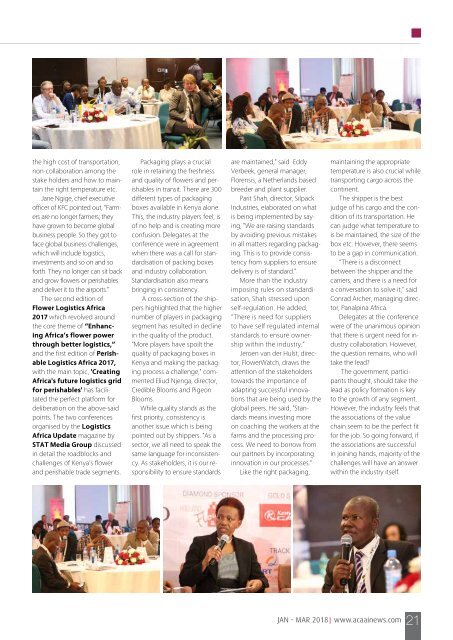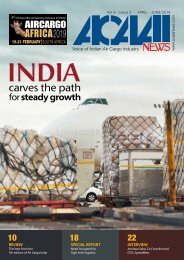Create successful ePaper yourself
Turn your PDF publications into a flip-book with our unique Google optimized e-Paper software.
the high cost of transportation,<br />
non-collaboration among the<br />
stake holders and how to maintain<br />
the right temperature etc.<br />
<strong>Jan</strong>e Ngige, chief executive<br />
officer of KFC pointed out, “Farmers<br />
are no longer farmers; they<br />
have grown to become global<br />
business people. So they got to<br />
face global business challenges,<br />
which will include logistics,<br />
investments and so on and so<br />
forth. They no longer can sit back<br />
and grow flowers or perishables<br />
and deliver it to the airports.”<br />
The second edition of<br />
Flower Logistics Africa<br />
2017 which revolved around<br />
the core theme of “Enhancing<br />
Africa’s flower power<br />
through better logistics,”<br />
and the first edition of Perishable<br />
Logistics Africa 2017,<br />
with the main topic, 'Creating<br />
Africa's future logistics grid<br />
for perishables' has facilitated<br />
the perfect platform for<br />
deliberation on the above-said<br />
points. The two conferences<br />
organised by the Logistics<br />
Africa Update magazine by<br />
STAT Media Group discussed<br />
in detail the roadblocks and<br />
challenges of Kenya’s flower<br />
and perishable trade segments.<br />
Packaging plays a crucial<br />
role in retaining the freshness<br />
and quality of flowers and perishables<br />
in transit. There are 300<br />
different types of packaging<br />
boxes available in Kenya alone.<br />
This, the industry players feel, is<br />
of no help and is creating more<br />
confusion. Delegates at the<br />
conference were in agreement<br />
when there was a call for standardisation<br />
of packing boxes<br />
and industry collaboration.<br />
Standardisation also means<br />
bringing in consistency.<br />
A cross-section of the shippers<br />
highlighted that the higher<br />
number of players in packaging<br />
segment has resulted in decline<br />
in the quality of the product.<br />
"More players have spoilt the<br />
quality of packaging boxes in<br />
Kenya and making the packaging<br />
process a challenge," commented<br />
Eliud Njenga, director,<br />
Credible Blooms and Pigeon<br />
Blooms.<br />
While quality stands as the<br />
first priority, consistency is<br />
another issue which is being<br />
pointed out by shippers. "As a<br />
sector, we all need to speak the<br />
same language for inconsistency.<br />
As stakeholders, it is our responsibility<br />
to ensure standards<br />
are maintained," said Eddy<br />
Verbeek, general manager,<br />
Florensis, a Netherlands based<br />
breeder and plant supplier.<br />
Parit Shah, director, Silpack<br />
Industries, elaborated on what<br />
is being implemented by saying,<br />
"We are raising standards<br />
by avoiding previous mistakes<br />
in all matters regarding packaging.<br />
This is to provide consistency<br />
from suppliers to ensure<br />
delivery is of standard.”<br />
More than the industry<br />
imposing rules on standardisation,<br />
Shah stressed upon<br />
self-regulation. He added,<br />
“There is need for suppliers<br />
to have self regulated internal<br />
standards to ensure ownership<br />
within the industry.”<br />
Jeroen van der Hulst, director,<br />
FlowerWatch, draws the<br />
attention of the stakeholders<br />
towards the importance of<br />
adapting successful innovations<br />
that are being used by the<br />
global peers. He said, "Standards<br />
means investing more<br />
on coaching the workers at the<br />
farms and the processing process.<br />
We need to borrow from<br />
our partners by incorporating<br />
innovation in our processes."<br />
Like the right packaging,<br />
maintaining the appropriate<br />
temperature is also crucial while<br />
transporting cargo across the<br />
continent.<br />
The shipper is the best<br />
judge of his cargo and the condition<br />
of its transportation. He<br />
can judge what temperature to<br />
is be maintained, the size of the<br />
box etc. However, there seems<br />
to be a gap in communication.<br />
“There is a disconnect<br />
between the shipper and the<br />
carriers, and there is a need for<br />
a conversation to solve it,” said<br />
Conrad Archer, managing director,<br />
Panalpina Africa.<br />
Delegates at the conference<br />
were of the unanimous opinion<br />
that there is urgent need for industry<br />
collaboration. However,<br />
the question remains, who will<br />
take the lead?<br />
The government, participants<br />
thought, should take the<br />
lead as policy formation is key<br />
to the growth of any segment.<br />
However, the industry feels that<br />
the associations of the value<br />
chain seem to be the perfect fit<br />
for the job. So going forward, if<br />
the associations are successful<br />
in joining hands, majority of the<br />
challenges will have an answer<br />
within the industry itself.<br />
JAN - MAR <strong>2018</strong>| www.acaainews.com 21




